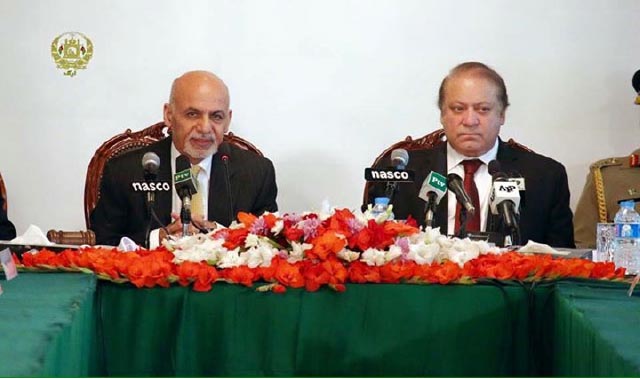The ‘Heart of Asia’ conference held in Islamabad on Wednesday with focus on improving cooperation between Afghanistan and Pakistan and helping the Afghan peace process. At the sidelines of the conference, officials from Afghanistan, Pakistan, China and the United States agreed on resuming the stalled peace process between the Afghan government and the Taliban. Afghan and Pakistani officials reiterated their determination for improving ties between the two countries and cooperating over the peace process in Afghanistan. Pakistani Prime Minister Nawaz Sharif once again expressed his country’s support to the peace process in Afghanistan and reassured that “enemies of Afghanistan were enemies of Pakistan”. Representatives of many regional countries including China, India and the United States participated in the conference, providing a major opportunity for Afghanistan and Pakistan to discus economic cooperation, peace and stability at regional level.
The first day impressions from the sidelines of the conferences were remarkable. The governments of Afghanistan and Pakistan seem prepared to have frank talks over the peace process in Afghanistan and other thorny issues related to security in both countries. Pakistan offered an extraordinary welcome to the Afghan delegation. Pakistani Prime Minister Nawaz Sharif and the country’s powerful military chief of Army staff welcomed President Ghani at Islamabad airport. The participating officials from Afghanistan, Pakistan, China and the United States had also a four-nation session behind closed doors. As an important gesture of support to the Afghan peace initiative, Nawaz Sharif reiterated his previously-stated stance that the enemies of Afghanistan were enemies of Pakistan, suggesting his intent for convincing Afghan officials that he has sincerity over promises of his country.
President Ashraf Ghani also reiterated that he does not believe in blame games, trying to assure the Pakistani Prime Minister that he is once again counting on his promises over the peace efforts in Afghanistan. Ghani mentioned that there were too much skepticism in Afghanistan over Pakistan’s sincerity and role in the Afghan conflict and peace process. Participating in the conference in Islamabad, President Ghani is tested for a second time his too-much publicized overture to Pakistan for the country’s help in the peace process in Afghanistan. President Ashraf Ghani’s Pakistan policy has been facing excruciating difficulties as it did not yield any tangible results in getting the peace process started or the violence being decreased. Well aware of the internal backlash and wary of past failures, the Afghan President seemed more cautious this time over his expectations from the government of Pakistan.
As reflected on the first day of the talks at the sidelines of the conference in Islamabad, there are immense potential for promoting a regional cooperation over resuming the peace process in Afghanistan. Notably, China’s particular influence on Pakistan and the country’s interest in helping Afghanistan and Pakistan to cooperate over security issues and peace in Afghanistan is seen as a valuable opportunity for the ongoing efforts. China seem interested in playing an active role in helping the Afghan peace process and getting the two countries resolve their differences and cooperate for their security and stability. Both Pakistan and Afghanistan knows well this opportunity and the need to work closely with the United States and China to reach common grounds over security issues and peace in Afghanistan. Both the governments of Afghanistan and Pakistan need to integrate their approaches regarding the war and peace efforts in Afghanistan with an international and regional cooperation for bringing peace and stability in the region.
However, there are also conflicting policies regarding the conflict in Afghanistan among the regional players participating in the conference in Islamabad. Iran’s foreign minister Jawad Zarif expressed concerns of an emerging Islamic State in Afghanistan as the warring factions of the Taliban are fighting each other. Iran seems to be more concerned with the emergence of the so-called Islamic State while all militant groups are existential threats to the government of Afghanistan. On the other hand, India perceives all militant groups a long-term threat for its interests and the stability of the region. While the United States is gradually pulling back from the Afghanistan conflict and becoming more receptive to participation of the Taliban in a political process in the future. In the meantime, the emergence of the Islamic State group has also become a concern for the United States.
However, there is a common understanding among a majority of the regional players and world powers about the need for improving stability and security in the region and particularly in Afghanistan and Pakistan. Whether the regional conference in Islamabad will result to a concrete action for promoting stability in the region and supporting the peace process in Afghanistan or not depends on Pakistan and Afghanistan’s determination to seek a regional cooperation over peace and stability in the region. Afghanistan and Pakistan have now a remarkable shared understanding of what is needed for improving security in both countries and ending the conflict in Afghanistan. What the two countries also need is to seek a common ground on the future of the Taliban and other militant groups and their integration with the political process in the country. The two countries should recognize areas where cooperation between the two countries fail and progresses stall. They need to work on these areas to prevent any possible deterioration of relations and possible collapse of cooperation in the future.
The ‘Heart of Asia’ conference in Islamabad is a unique forum for promoting a regional consensus on promoting peace and stability in the region focused on helping the peace process in Afghanistan. There are potential capacity with the regional politics to help peace and stability in the region and Afghanistan.

